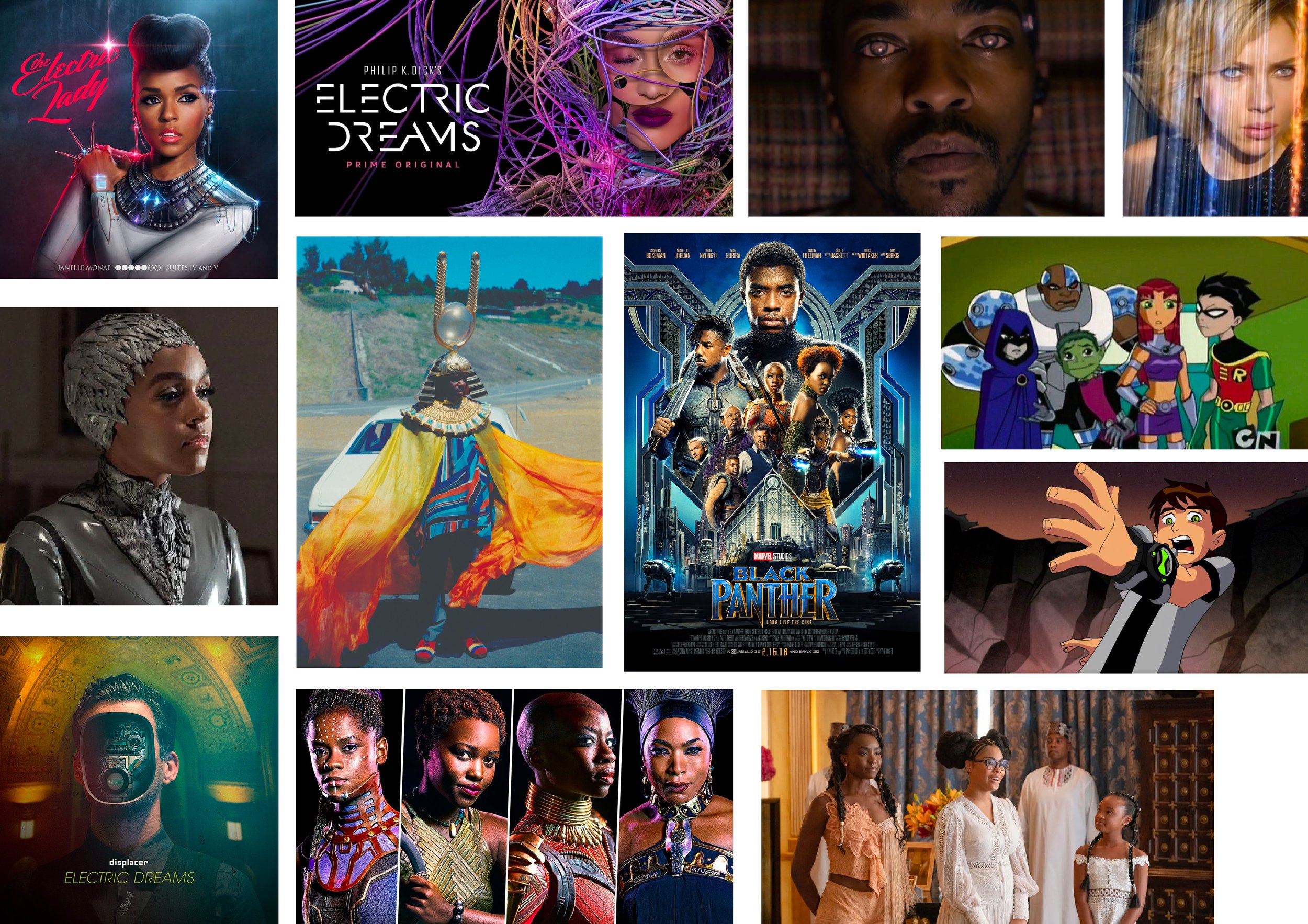Transhumanism:
The Tran3lator
Date: 2021
Duration: 2 months
Project Type: Prototyping, future thinking, video editing, academic research, speculative design.
Language is a very important tool of communication in our everyday life. It’s a part of who we are, but what if some languages would disappear, together with our culture and identity? In this speculative project, The Tran3lator eliminates all general– and dying languages by using the spoken data of it’s surroundings, this way everyone who does not speak a dominant language, will be programmed through The Tran3lator earpiece to forget their langue and only speak one dominant language.
Through my process I was introduced to future thinking, afro futurism and speculative design. These subjects helped me prototype and develop a concept.
Transhumanism
Mind mapping
When thinking about Transhumanism I made a mind map of what came to mind and my interests linked to the idea of Transhumanism, the future and technology.
My interests:
- Technology (Transhumanism) and Religion
- New way of communication: Linguistics
- Improving the eyesight: Smart glasses
- Re-live the past: VR Experience
- Printable food
- Facial Recognition Systems
- Radio-frequency identification (RFID)
Neil Harbisson is not able to see colours and became a cyborg who has an antenna in his head, making him able to hear colours instead of seeing them. Listening to this Ted talk made me see that he antenna on his head translates colours into sounds, making it a new languages and therefore a new way of communication that is understandable for Harbisson.
2. Chosen Topic
Languages in the future – what will we speak?
What will the future of language look like? The article ‘Languages in the future – what will we speak?’ shows the world languages of today and of the future, it also shows the languages of coding. Now, it also introduced us to how technology can be used in language, by using a translating pen or an earpiece. Not only does this article provide us with the facts, but also with a probable solution in easily translating a foreign language.
(“Languages in the Future - What Will We Speak?” Focusing Future, Punda, 22 May 2018, www.focusingfuture.com/me-consumer/languages-in-the-future-what-will-we-speak/. )


3. AfroFuturism
Above I created two mood boards and my own description of combining AfroFuturism with Transhumanism.
AfroFuturism is a beautiful aesthetic to combine with Transhumanism and give it a cultural touch, which caused me to develop a greater interests of the future of black culture and technology.
AfroFuturism + Transhumanism =
Blended elements of black history and culture with futuristic themes, envisioning a future where technology and the human body merge. This movement spans literature, music, and art, imagining transformative possibilities through the lens of African diasporic identity and innovation.
4. Thought Process
Future of language, racist computers and a mixed raced population.
Through my thought process and research, I remembered certain articles about race and languages. I connected these articles with the aesthetics of AfroFuturism with the concept of Transhumanism in mind,
My thought process: AfroFuturism > Black People > People of Colour > Racial discrimination > Mixed Race Article > Will language and culture fade away or become one? > Will we become one race?
AfroFuturism + Transhumanism
Racial discrimination: Ruha Benjamin
Mixed race article: National Geographic
5. The Future of Language
Amazed by the term AfroFuturism, I conducted research on the history of (African) languages.
Some African countries lost most of their native languages or dialects due to colonisation. According to Afu Hirsch, "English was imposed on Africans by force."
In a paper by Kofi Agyekum, he points out how Linguistic imperialism has deepened in African countries. Children cannot speak their mother tongue anymore since the most dominant languages became English, French, Portuguese, or Arabic.
Sources:
Hirsch, Afua. “Africa's Colonisation of the English Language Continues Apace | Afua Hirsch.” The Guardian, Guardian News and Media, 29 Jan. 2020, www.theguardian.com/commentisfree/2020/jan/29/africa-coloniasation-english-language-oxford-dictionary-nigerian.
Agyekum, Kofi. “Chapter 6: Linguistic Imperialism and Language Decolonisation in Africa through Documentation and Preservation.” African Linguistics on the Prairie: Selected Papers from the 45th Annual Conference on African Linguistics, by Jason Kandybowicz et al., Language Science Press, 2018, pp. 87–88, langsci-press.org/catalog/book/120.
Why is language important?
A language is a form of communication and a way to convey what you think or feel. Language comes in different forms in formal, informal, social, slang, etc. The way we communicate in a language can be verbal, non-verbal, written, a listing-, and visual communication.
Distinguish individuals from one another.
Tool to help create cultural ties friendships and relationships.
Language helps people in society to express their different opinions effectively
Language Technology
“Most linguists agree that roughly 6000 languages exist in the world today. Yet 90% of these may be doomed to extinction, with much of this loss happening in the coming century. We may now be losing a language every day.”
— David Graddol (The Future of Language)
‘Correct’ language in digital society: How computer devices has impact on traditional orthography, and the use of Alexa and Siri. English language is part of our digital life. source
Importance of language: Language is a important part of culture. source
10 important detailed reasons of language: source
7 reasons why it’s important to learn a foreign language: To learn a new language helps understanding ones own culture, and opens up job opportunities in foreign countries. source
Conclusion
Speculative Design: The Tran3lator
The Tran3lator is a device that eliminates language diversity by enabling the world to communicate in a single language. Designed as an earpiece that integrates with the body, it becomes a part of the user, transforming the way we interact. By standardising communication, the device aims to create better opportunities for education, employment, and global unity.
However, this comes at a cost. The Tran3lator erases all general and endangered languages by analyzing spoken data from its surroundings. Users who do not speak the dominant language (English), are programmed through the device to forget their native tongue, ultimately unifying everyone under one language.
Language is a vital part of our identity and culture. What happens if it is taken away? Will the pursuit of better communication and global opportunity come at the expense of the diversity that makes us human?
If we are all forced to speak one language, we risk losing our cultural identities.
My take on language and communication
Language is more than a tool for communication—it is an integral part of our culture and history. If all cultures were to merge into a single identity, would this not erase the unique traditions and histories we have carried through the ages? Yet, in a world driven by globalisation, we may be compelled to adopt a single universal language.
Language is essential for humans to communicate, whether verbally or non-verbally. It is a survival tool that shapes our interactions and relationships. However, the way we communicate is also part of who we are, influencing our cultural identity. This is why we cherish and defend the unique meanings of being Asian, Black, Hispanic, and more.






